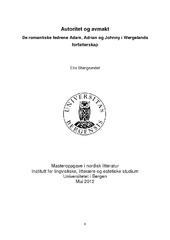| dc.contributor.author | Stengrundet, Elin | eng |
| dc.date.accessioned | 2012-08-02T08:10:55Z | |
| dc.date.available | 2012-08-02T08:10:55Z | |
| dc.date.issued | 2012-05-15 | eng |
| dc.date.submitted | 2012-05-15 | eng |
| dc.identifier.uri | https://hdl.handle.net/1956/5883 | |
| dc.description.abstract | Avhandlingen er en motivstudie av farsfiguren og far-sønn-relasjonen i Henrik Wergelands forfatterskap, den store representanten for den norske romantikken. En overordnet tese i dette prosjektet er at dette utgjør sentrale motiver i Wergelands lyrikk og at farsfremstillingen ikke kan sies å være verken endimensjonale eller entydig negative, men preget av tvetydigheter og spenninger. Jeg undersøker farsproblematikken i tre sentrale tekster i forfatterskapet: Skabelsen, Mennesket og Messias (1830), Jan van Huysums Blomsterstykke (1840) og Den engelske Lods (1844). I alle disse verkene er den konkrete farsfiguren sentral, og man finner også en sterk relasjon mellom far og sønn(barn). Til grunn for lesningen ligger en romantikkforståelse som åpner opp for det dynamiske i den romantiske teksten, representert av Jerome McGann. Innfallsvinkler til lesningene finner jeg i tidligere forskning på romantikkens farsfigur, representert av Kurt Wais, Wendell Stacy Johnson og Horst Meller, og i kjønnsforskningen, primært den nordisk mannsforskning. En generell tendens i resepsjonen er en vektlegging de idealistiske nivåene i verkene. Gjennom min egen tilnærming finner jeg at verkene rommer en annen sentraltematikk som peker mot noe aktuelt. De peker mot ideologiske og kulturelle problemer i samtiden som i mine lesninger er knyttet til til kjønnsideologi og familieproblematikk. Samtidig finner jeg også en mer privatisert undertone, der disse områdene får et mer individualisert og til dels biografisk preg. Mine funn er at Wergelands diktverk har et særegent uttrykk sammenlignet med tidligere forskning på den europeiske romantikkens farsbilde. I tillegg finner jeg at farsfremstillingene nyanserer kjønnsforskningens oppfatning av at romantikkens skjønnlitterære fedre er endimensjonale og stereotype. Mine lesninger viser tvert imot at farsfremstillingene er preget av spenninger. Disse spenningene er ofte knyttet til kjønnsproblematikk, som enkelte kjønnsforskere mener ikke gjør seg gjeldende i romantikken. I det oppsummerende kapitlet viser jeg at mine lesninger bare til dels går overens med tidligere påståtte utviklingstrekk i forfatterskapet, at motivene kan regnes som vesentlig i forfatterskapet som sådan, og jeg antyder er enkelte biografiske koblinger. | en_US |
| dc.description.abstract | This thesis is a motif study of the father figure and the father-son relation in the authorship of Henrik Wergeland, the grand representative of the Norwegian Romantic era. A superior thesis in this project is that this constitute central motifs in Wergelands lyric poetry and that the declaration of the father not can be seen as being only one-dimensional or merely negative, but characterized by ambiguity and tension. I examine the father problematic in three central texts in the authorship: Skabelsen, Mennesket og Messias (1830), Jan van Huysums Blomsterstykke (1840) and Den engelske Lods (1844). In all these works the concrete father figure central, and a strong relation between father and son is found. At the core of the reading lies an understanding of the romantic that opens to the dynamic in the romantic text, represented by Jerome McGann. I approach the reading through earlier research on the father figure of the Romantic era, represented by Kurt Wais, Wendell Stacy Johnson and Horst Meller, and in gender research, primarily the Nordic research on the male gender. A general tendency in the reception is an emphasizing on the idealistic level in the works. Through my own approach I find that the works give room to another central thematic that points to something current. They point at ideological and cultural problems, which in my readings are linked to gender ideology and family problematics. Simultaneous I find a more private undertone, where these areas get a more individual and partly biographic impression. My findings in the lyric works of Wergeland have a distinctive expression compared to earlier research on the European Romantic era's picture of the father. In complement I find that the statements of the father gives a nuance to the gender studies view that the father figures in fiction are one-dimensional and stereotypical. My readings shows, on the contrary, that the father figure projections are characterized by tensions. The tensions are often attached to gender problematics, that some researchers on gender imply that are not present in the Romantic era. In the numerate chapter I show that my readings only partly support matching developing features in the authorship as such, and I do suggest some biographical couplings. | en_US |
| dc.format.extent | 1074947 bytes | eng |
| dc.format.mimetype | application/pdf | eng |
| dc.language.iso | nob | eng |
| dc.publisher | The University of Bergen | eng |
| dc.subject | Wergeland romantikk far sønn motiv | eng |
| dc.title | Autoritet og avmakt - De romantiske fedrene Adam, Adrian og Johnny i Wergelands forfatterskap | eng |
| dc.type | Master thesis | |
| dc.description.degree | Master i Nordisk språk og litteratur | |
| dc.description.localcode | MAHF-NORD | |
| dc.description.localcode | NOLISP350 | |
| dc.subject.nus | 711123 | eng |
| dc.subject.nsi | VDP::Humanities: 000::Literary disciplines: 040::Nordic literature: 042 | |
| fs.subjectcode | NOLISP350 | |
